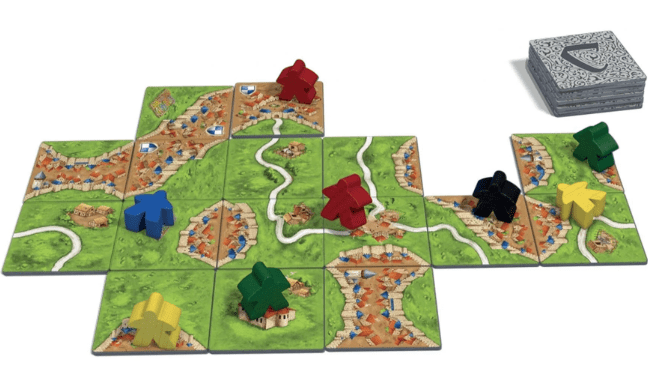A huge room with tables with groups of people sitting around. The atmosphere is rather competitive and it’s quite noisy — people laugh and argue with one another. You can sense tons of endorphins in the air.
Each group is stuck in a different universe. You can see people struggling setting train paths in Ticket to Ride, trying to bribe the Sheriff of Nottingham or checking Scrabble Solver stealthily under the table.
It’s a typical stage set of a board game cafe. However, over the past few years, you can also experience a similar scenography in more and more households. Friends and families are now meeting up for a couple of board game rounds much more intensively than over a decade ago. What are the reasons for such significant growth in the popularity of tabletop games?
The Very Beginning of the Revival
The first decade of 2000 was rich in premieres of board games that livened up the game industry and remained popular till today. Among the most successful tabletop games of that decade was Carcassonne (2000), Ticket to Ride (2004), BattleLore (2004), Descent: Journeys in the Dark (2005), Pandemic (2008), Dominion (2008).
Average Monopoly gamers got curious about the depth of the board games world while the board games geeks would help sustain the industry’s development through spreading the novelties in their social circles.

The Change in the Perception of Tabletop Games
From the 80s up to the beginnings of the 2000s, board games were considered to be a nerd thing. The introduction of the above-mentioned titles to the market started to draw the attention of ordinary mortals, as well.
Especially in the era of an unstoppable technical development and increasing addiction to social media, YouTube, and very often computer games, people felt surrounded by the electronics. Board games became a healthy alternative to the Internet-steered way of spending time.
The Reversing Trend in Entertaining Activities
We’re also looking for alternatives to wandering from one pub to another or binge-watching Netflix shows with our friends and partners. Rediscovering board games easily became one of our favourite ways of bringing us together.
Entertainment once reserved for nerds only is now a mainstream integrating activity for people of all age, genders, and hobbies.
The renewed success of board games is reinforced by the fact that along with the technological boom, more and more of us have an office job and we’re spending over 8 hours sitting in front of computer screens. Our eyes and mind need different forms of relaxation and tabletop games fulfil this role perfectly.
Stimulating Effects on the Imagination
How a piece of cardboard and plastic pawns can be interesting enough to hold us at a game for hours? At first glance, it might seem ridiculous. With each roll of the dice, though, we’re falling deeper and deeper into a whole different world.
Getting to know the rules better with every other round and the competitive instinct give us a good energy boost. The sense of engagement grows and winds up our imagination. With fellow gamers, we become a part of the game with our body and mind.
The Ultimate Ice-Breaker
Social situations are especially difficult for shy and withdrawn people. Getting to know each other, finding conversation topics, and keeping your insecurities down can be a great challenge. Making the first steps among new friends requires sometimes a solid ice-breaker.
Tabletop games are perfect for a starter! Once you get focused on understanding and remembering the rules, you forget how stressed you were!
While playing, people are incomparably more relaxed than just meeting over a beer. They’re not that self-absorbed, don’t choose their words too carefully, and simply want to have fun. We don’t think there’s anything more casual and relaxing than having a board game evening together!
Supporting Children’s Development
If tabletop games have such an impact on already shaped grown-ups, just think of the wonderful benefits of gaming for kids. It is not without a reason that more and more parents are reaching for board games for their children.
Board games have an incredibly positive influence both on mathematical and abstract thinking and social skills. The games teach them to lose and win respectfully, enjoy the participation itself, the idea of rules and order, and how to spend time unplugged!
Keep the Analog Tradition!
For us, adults, it might just be a great comeback of board games. However, the younger generations raised mostly on video games and mobile applications consider tabletop games more as a curiosity.
Board games cafes are popular places to visit with friends and every year there are premieres of new games. We have to support the board game tradition not only with buying or renting games but also showing the fun to our kids and playing with them systematically. Family board games sessions create wonderful memories and can be the beginning of a real family tradition!






 Your total news and information resource for all things Science, Technology, Engineering / Mathematics, Art, and Medicine / Health.
Your total news and information resource for all things Science, Technology, Engineering / Mathematics, Art, and Medicine / Health.
Leave a Comment